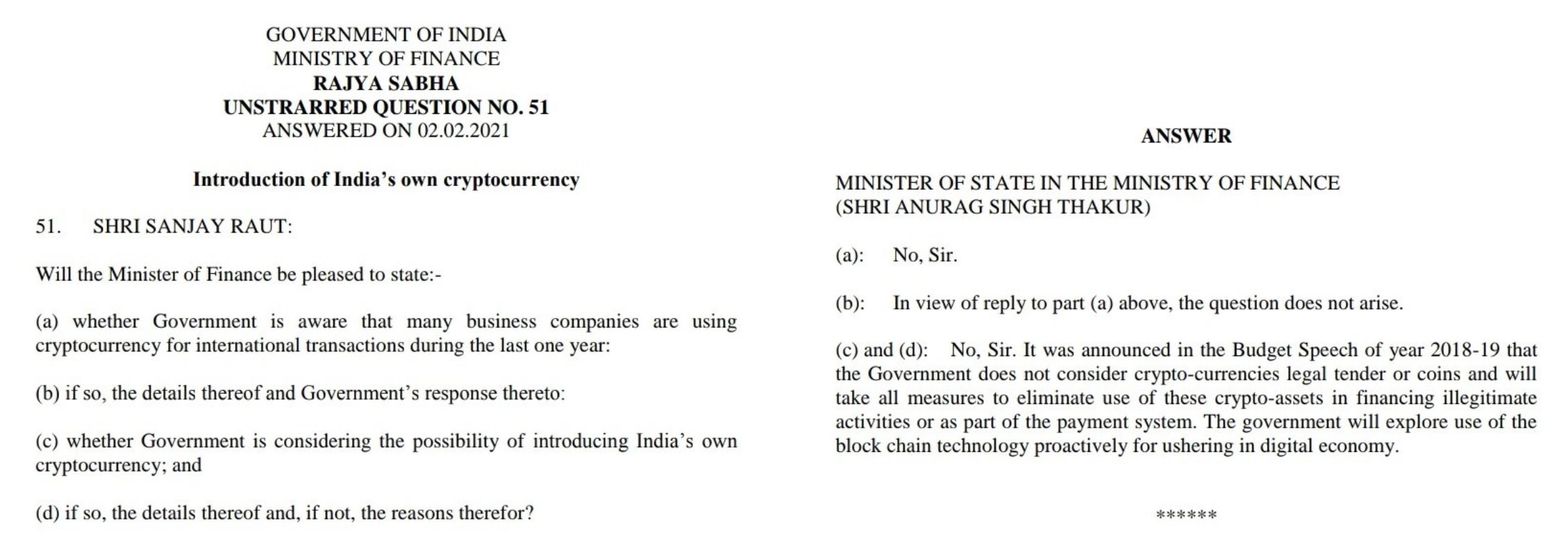The Indian government has clarified its position on the country’s cryptocurrency and digital currency in responses from the Treasury Department in Rajya Sabha, the upper house of India’s parliament. The Indian crypto industry sees this clarification as positive news and the government is unlikely to see an outright ban on cryptocurrencies, including Bitcoin.
Indian government answers questions about cryptocurrency and digital rupee
Rajya Sabha, the upper house of the Indian parliament, published a list of questions and written answers on February 2nd, which contained the topic of “Introduction of India’s own cryptocurrency”.
MP Sri Sanjay Raut asked the Treasury Secretary if the Indian government was aware that many companies were using cryptocurrency for international transactions in the past year and whether the government is considering the possibility of introducing India’s own cryptocurrency.
The questions were answered by Minister of State for Finance Anurag Singh Thakur. He replied to the first question with “No sir”.
When asked about the digital rupee, he replied, “No sir. In the 2018-19 budget speech, it was announced that the government would not consider legal tender or coins for cryptocurrencies and would take all measures to stop the use of these crypto-assets to fund improper activities or as part of the payment system. The government will proactively examine the use of blockchain technology to usher in the digital economy. “
Answers from Minister of State for Finance Anurag Thakur in Rajya Sabha about cryptocurrency and digital rupee.
The Q&A published by Rajya Sabha followed the listing of the cryptocurrency law to be introduced at the budget meeting in Lok Sabha, the lower house of the Indian parliament.
According to the Lok Sabha brochure, the aim of the crypto law is to create a regulatory framework for the issuance of the digital rupee by the Reserve Bank of India (RBI) and to ban “private cryptocurrencies”. The RBI recently announced that it is investigating the need to issue a central bank digital currency (CBDC).
Proponents say outright ban is unlikely, definition of “private digital currencies”
Commenting on the Minister of State for Finance’s replies, CEO of local crypto exchange Wazirx, Nischal Shetty, said that Shri Anurag Thakur’s replies “show the government is focused on curbing illegal activity and payment systems.” He explained:
This removes more confusion that there won’t be a complete ban on crypto.
Shetty previously said, “I don’t think there will be a complete ban on crypto in India. Most importantly, no government anywhere in the world is going to destroy Rs. Assets of more than 7,500 crore owned by 7 million people. “
Unocoin Crypto Exchange CEO Sathvik Vishwanath said, “While this does not indicate the future of the crypto industry in India, it is evidence that it is moving in a direction favorable to crypto.”
The CEO of the crypto banking platform Cashaa, Kumar Gaurav, told news.Bitcoin.com:
It’s too early to comment on what the draft term “private cryptocurrency” refers to. Given the understanding that cryptocurrency is a global and decentralized system, no government can ban it.
“That would require this kind of technology and control that technically doesn’t belong to anyone. You can certainly ban the legitimate use of crypto, which just makes it difficult for an ordinary person who doesn’t understand it to get involved with, ”he added.
“We understand, however, that the Indian government is trying to crack down on fraud that runs on behalf of Bitcoin, as 90 percent of these scams don’t even involve a real cryptocurrency,” he said. “We are confident that the government will develop regulations and guidelines that will control the fight against fraud and allow innovation in the industry, including crypto like Bitcoin, Cashaa and Ethereum, which are built on the public chain, to grow and thrive. ”
Do you think the Indian government will ban Bitcoin? Let us know in the comments below.
Photo credit: Shutterstock, Pixabay, Wiki Commons
Disclaimer of liability: This article is for informational purposes only. It is not a direct offer or an invitation to make an offer to buy or sell, or a recommendation or approval of products, services or companies. Bitcoin.com does not provide investment, tax, legal, or accounting advice. Neither the company nor the author are directly or indirectly responsible for any damage or loss caused or allegedly caused by or in connection with the use of or reliance on any content, goods or services mentioned in this article.

